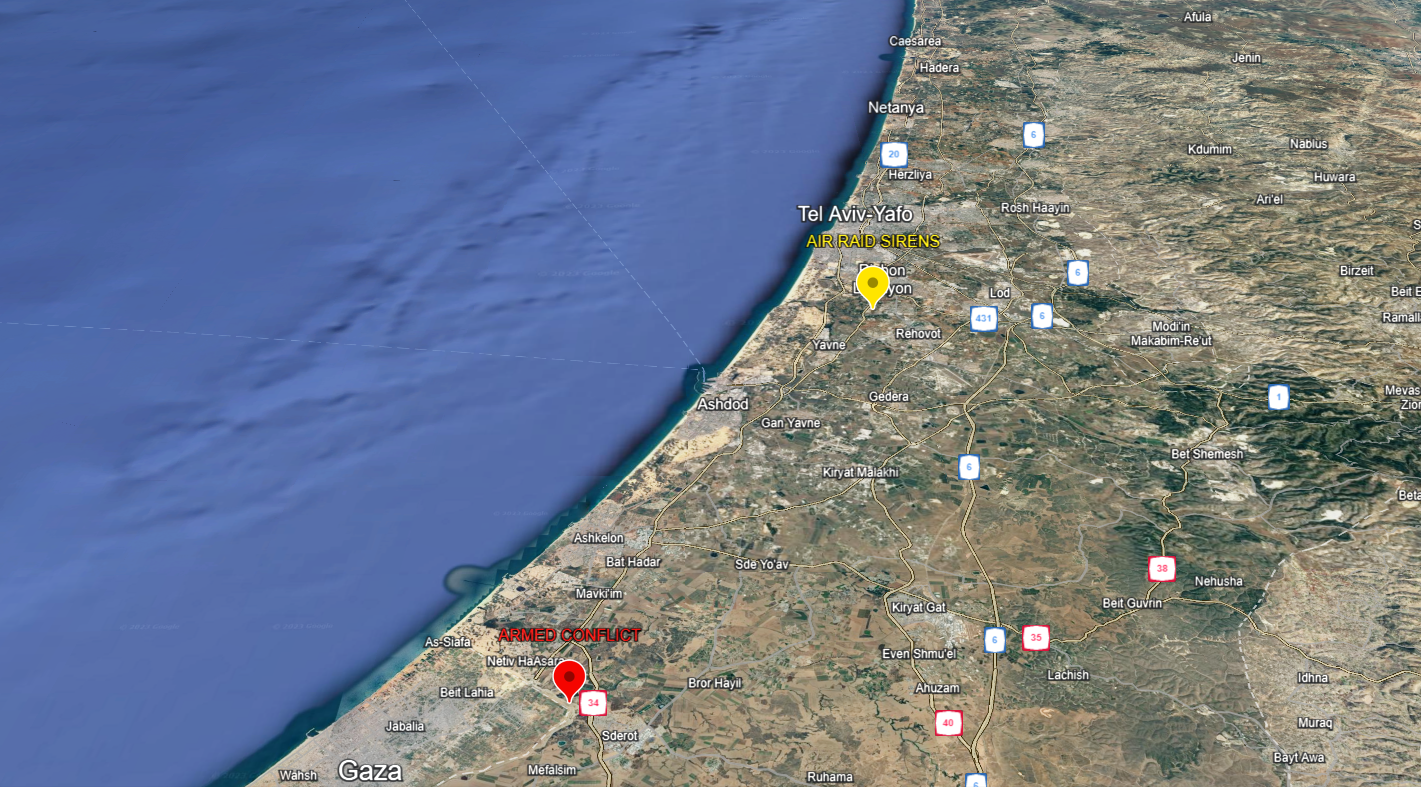Overview: On October 7, 2023, a significant escalation in the Israeli-Palestinian conflict occurred when Hamas militants launched a barrage of rocket attacks against Israel. This event prompted a swift and dynamic response from both sides.
Details:
- Rocket Attacks: Beginning at approximately 0630 hours local time, Hamas launched a massive rocket attack into Israel. Estimates vary, with initial reports suggesting up to 2,200 rockets fired by Hamas, while Hamas claimed to have launched around 5,000 rockets. The rocket attacks continued until 1640 hours local time, resulting in the Israeli Defense Forces (IDF) confirming a total of 3,000 rockets fired at Israel. Hamas referred to this operation as ‘Al-Aqsa Flood.’
- Infiltration: Under the cover of the rocket barrage, Palestinian militants, reportedly led by members of Hamas’ Al-Qassam Brigades, infiltrated southern Israel through multiple crossing points. Videos circulated online showed breaches in the border walls/fences, the crossing of border checkpoints by vehicles and motorcycles, and even militants using paragliders to enter Israel.
- Hostages: Reports and imagery indicated that Hamas militants took Israeli soldiers, civilians, and foreign workers, including Thai, Filipino, and Nepalese individuals, as hostages. These incidents occurred at various locations, including Ofakim, approximately 30 km east of the Gaza Strip.
Israeli Response:
- Operation ‘Swords of Iron’: In response to the attacks, Israeli Prime Minister Benjamin Netanyahu declared a state of war, and the IDF initiated Operation ‘Swords of Iron.’ Israeli Air Force airstrikes targeted military compounds and command centers belonging to Hamas in the Gaza Strip.
- Mobilisation: IDF reserves were mobilised, indicating preparations for a ground offensive operation to rescue hostages and dismantle Hamas infrastructure in Gaza.
International Reactions:
- Various international leaders and organizations issued statements in response to the situation.
- Hezbollah expressed support for the Palestinian factions, while Saudi Arabia called for a cessation of hostilities.
- US President Joe Biden voiced support for Israel’s right to defend itself, and the UK, France, India, the EU, and other nations condemned Hamas’ attacks on Israeli civilians. NATO reaffirmed support for Israel’s right to self-defense.
Analysis:
- Planning and Preparation: The scale and sophistication of Hamas’ offensive operations suggest significant planning and preparation. While there is no confirmed link to Israeli-Saudi normalisation, the timing of the attack could temporarily hinder such agreements.
- Israeli Response: International support and domestic demands may provide Israel with the latitude for a robust response to the Hamas attack.
- External Threats: A focus on operations in southern Israel increases the risk of confrontations with other groups like Hezbollah and Palestinian militants in Lebanon and Syria.
Operation ‘Al-Aqsa Flood’:
- Hamas demonstrated unprecedented capabilities during this operation, involving air, land, and naval assets.
- The timing aligns with progress towards Israeli-Saudi normalization.
Operation ‘Swords of Iron’:
- IDF mobilisation and hostage situations are likely delaying offensive operations, but a ground offensive is anticipated.
External Threats:
- There is an elevated risk of attacks from other “axis of resistance” factions, particularly Hezbollah and Palestinian militants in Lebanon and Syria
- Violence in the West Bank is on the rise, with militant organizations calling for attacks on Israelis.
Assessments and Forecast:
- Clashes and further attempts at hostage-taking and kidnapping are possible as Israeli security forces engage with infiltrated terrorists.
- Hamas seeks to escalate tensions regionally and may encourage attacks in various areas, including the West Bank, Arab-populated regions, mixed cities in Israel, and the northern border.
Recommendations:
- Travel Precautions: Consider deferring nonessential travel to Israel due to the ongoing escalation.
- Safety Measures: Those in southern and central Israel should remain indoors, prepare bomb shelters, and follow early warning sirens’ instructions.
- Emergency Contacts: Maintain awareness of local authorities’ instructions and seek assistance as needed.
This intelligence briefing provides a comprehensive overview of the current situation, including the events, responses, analysis, and recommendations for individuals and organizations affected by the ongoing conflict.
Contact NSI Global for contingency consultation and planning related to the situation.




